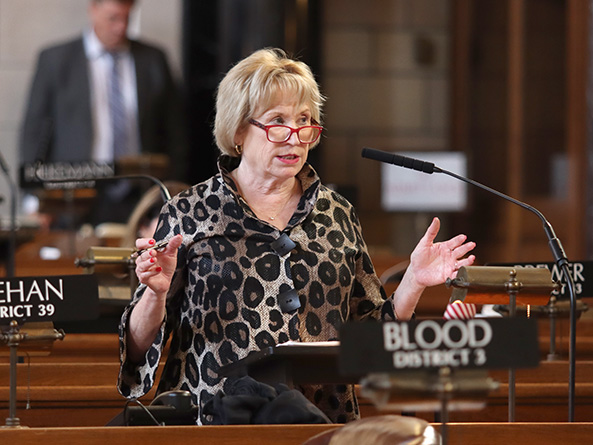Tax credit scholarship proposal stalls on first round
Senators rejected a second attempt to advance a bill from general file that would create a tax credit scholarship program for Nebraska private school students after a failed cloture motion Jan. 12.
LB364, introduced by Elkhorn Sen. Lou Ann Linehan, fell four votes short of a successful first-round cloture motion last session. It returned to the agenda this year after Linehan designated it as her priority bill for the 2022 session.
She said the proposal would give up to 1,500 children the opportunity to attend a private school that better meets their needs, a choice not available to many low-income Nebraska families.
“If you can afford it, you have [school] choice,” Linehan said. “But if you can’t, you do not.”
The bill would allow individuals, passthrough entities, estates, trusts and corporations to claim a nonrefundable income tax credit of up to 50 percent of their state income tax liability on contributions they make to nonprofit organizations that grant scholarships to students to attend private school.
Only Nebraska residents would be eligible for the scholarships, which could be used to pay tuition and fees at a qualifying privately operated elementary or secondary school in Nebraska.
Students would be eligible for the scholarships if, among other requirements, they are a dependent member of a household with a gross income that does not exceed the eligibility guidelines for reduced-price meals under the National School Lunch Program.
As introduced, LB364 would allow the state Department of Revenue to grant $10 million in credits in 2022. After that, if at least 90 percent of the credits in any given year are claimed, the annual limit would increase by 25 percent.
A pending Revenue Committee amendment instead would limit the total amount of credits available each year to $5 million and omit the mechanism allowing credits to increase each year.
The amendment also includes the amended provisions of LB531, introduced by Albion Sen. Tom Briese.
Under his proposal, taxpayers who make a qualifying financial contribution to certain child care and early childhood education programs in Nebraska could apply for a nonrefundable income tax credit equal to a portion of the contribution.
Sen. Justin Wayne of Omaha supported LB364, saying the achievement gap for Black students in the Omaha Public Schools district persists despite increases in school funding.
“We can’t keep doing what we’re currently doing,” he said. “Let’s try something else.”
A pending Wayne amendment would end the credits after 10 years, which he said is enough time to determine whether the scholarships have a positive effect on students who receive them.
Omaha Sen. Terrell McKinney said he had changed his mind about LB364 since last year and now supports it. He said private schools could offer an alternative to North Omaha public schools that are failing some students.
Sen. Megan Hunt of Omaha opposed the bill, saying it would not address problems, including poverty and housing insecurity, that lead to the achievement gap.
She said the proposal would use public funds to indirectly benefit private schools that are allowed to discriminate against students and teachers based on their gender identity, sexual orientation and other factors.
Hunt introduced an amendment last session that would prohibit a scholarship granting organization from discriminating against students on the basis of race, color, religion, national origin, ancestry, citizenship status, gender, sexual orientation, gender identity, disability or special education status. It failed Jan. 12 on a vote of 17-26.
Sen. Adam Morfeld of Lincoln also opposed LB364, saying it would divert state tax dollars that could be used to improve underperforming public schools.
He offered an amendment that would require schools that enroll students who receive tax credit scholarships to comply with the same budgetary requirements that apply to public school districts.
“If we’re going to be providing … this type of incentive,” Morfeld said, “then these institutions should have to play by the same rules and have the same level of transparency as any other institution that receives this type of public benefit.”
Several senators questioned why the proposed credit should provide donors a greater, dollar-for-dollar tax benefit than other charitable donations, which qualify for a tax deduction that is calculated using a donor’s income tax rate.
After eight hours of debate on general file, Linehan filed a motion to invoke cloture, which would end debate and force a vote on LB364 and any pending amendments.
The motion failed on a vote of 28-14. Thirty-three votes were needed. A failed cloture motion results in debate on a proposal ceasing for the day. The bill is unlikely to be placed on the agenda again this session.


